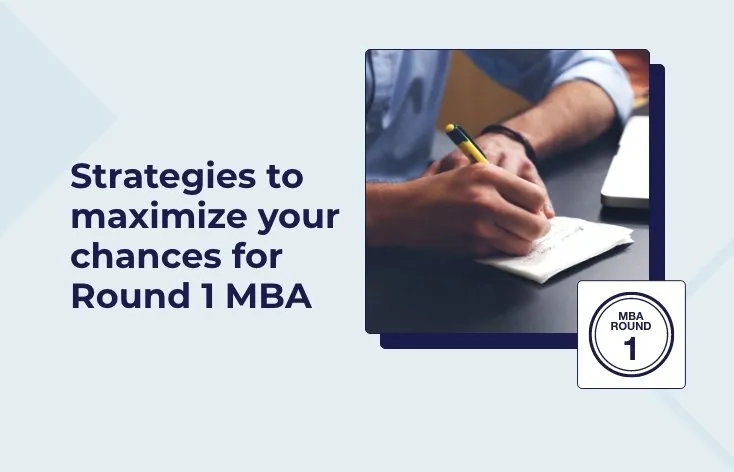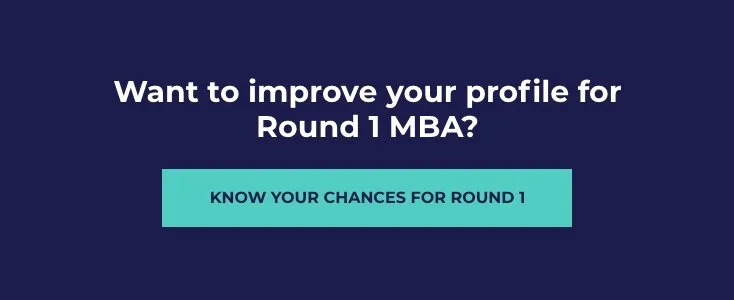Strategies to Maximize Your Chances for Round 1 MBA

After scoring a stellar GMAT score and having great ECAs backed by LORs from renowned companies, one may ask, what’s more? What can we do further to increase our chances at top B-School? When it comes to MBA, there is always more to it!
Every element of an MBA profile has its intrinsic value, yet all of them are thoroughly interconnected. To maximize your chances for a Round 1 MBA, you would need more than a stellar academic profile and somewhat a perfectly balanced application in terms of academic accolades, practical experience, analytical skills, and prominent examples of leadership.
With the deadlines being just a few months away and a lot of work hard to be required on your application, we at MBA and Beyond are determined to assist you in this demanding and time-consuming journey by providing relevant information on each element of an overall profile and how you can one interlink them with each other to cover up the imperfections in any one of them with a strategical advantage offered by the other. So what are you waiting for? Let’s get started!
For selection into Round 1 MBA top MBA program, a candidate needs to have an overall robust profile based roughly on three key factors:
A score on the GMAT or GRE and academic statistics;
Work experience/ CV/ Resumé and Personal statement; and
The Extracurriculars/ Community service & club participation.
Candidates must understand that apart from academic brilliance (and scores!), highlighting one’s personality through ECs or community service (or just by talking about your interests and passions!) is a significant factor in any B-School application.
This blog will help you understand how one can maximize their chances of admission in Round 1 MBA while dealing with the critical elements of a successful profile and how to bank on them to make an overall robust and successful MBA application. Finally, we will discuss in detail the timeline and when one should ideally get started with their MBA application,
Let us look at some of the most important elements of a good profile, other than the B-school essays (as we have already discussed them ), which are,
International Experience, Career Progression, and Leadership skills
When should you start working on your profile?
Frequently Asked Questions ( FAQs)
Academic Records
The elephant in the room! B-Schools need to know that they will be able to excel through their MBA curriculum even after years of staying out of school/college. And the best way to gauge this is your undergrad GPA. Hence, candidates need to have a stellar GPA and mention relevant accolades on their resumes. Some B-schools also request copies of transcripts demonstrating your performance at the UG degree level (or graduate degree, if you have directly gone to graduate school after completing the undergraduate degree). An upward trajectory with the GPA helps justify any lags in academic performance.
However, it’s also true that with a great GMAT score and a very strong profile, anyone with even an average GPA could get into top MBA programs; all they need is to explain with an additional letter the reasons behind their low GPA and give other examples of their academic brilliance in the form of certifications, accolades, recognition, and promotions.
Learn more about how you can compensate for a low GPA!
GRE or GMAT scores
The GMAT is always considered one of the most crucial elements of your overall academic profile. Moreover, for someone with a low work experience (around 2-3 years), AdComs heavily rely on applicants’ GPA and GMAT scores to display academic potential, critical thinking, and analytical abilities.
You can target a score that aligns with the average score of your target school. If we generalize, you can aim for a 700+ (And a 330+ GRE) for T30 programs, especially if you come from over-represented backgrounds.
It’s your profile and personality that will make it to top-notch schools. If you don’t believe us, hear it from an applicant with low GMAT who made it to top B-schools with as many as 100% scholarships!
You need to bring a strong, impactful personality to your application and address your low GPA and GMAT in Optional essays. Read the Optional essay of a successful applicant to understand this better.
ECAs
It’s just an extension of the question- Who are you? Elaborate on your volunteering experiences (if you have any), how you overcame the challenges, what was significant about your role, and what relevant skill-set did you develop? And if you don’t have an NGO/social impact story, just talk about what you do in your spare time. Who are you beyond your professional self? What are your passions and interests? What makes you happy?
Try to mold your ECAs to showcase your selfless nature, leadership abilities, communications skills, and sense of social well-being.
International experience, Career Progression, Leadership skills
If you target the top-notch US or Europe B-schools, you need to highlight a strong International experience. And to break the myth for you, you don’t always have to travel to dozens of countries. Instead, just highlight how you have and are keen to learn from different perspectives and cultures and how it has/can shape your personality.
Also, make sure you establish yourself as an absolutely strong leader and an ambitious person with fast-track career growth.
How should you highlight strong leadership skills? Get your profile evaluated with a 360-degree analysis with our experts!
TOEFL or IELTS score
TOEFL or IELTS scores are a way to test the proficiency in English of a candidate, as most MiM programs around the globe are offered with English as the primary mode of communication. However, this requirement is for candidates whose native language is non-English and who haven’t had English as a subject or primary method of instruction in their UG degree.
Hence, for applicants who come from an English background or whose undergraduate degree education had taken place entirely in English, the TOEFL/ IELTS is not required. A good score for TOEFL is considered around 95+ in a total of 120, whereas for IELTS, a score of 8 or 7.5+ is regarded as the average score whereas, for a score of 6.5 IELTS or lower, you could always reappear.
WHEN SHOULD YOU START WORKING ON YOUR R1 APPLICATIONS?
Ideally, NOW (implying 4-5 months before the deadline). But, yes, you should start working on the pre-application phase already, especially if you wish to target Round 1 MBA and Early action rounds. If you are unaware of this term (that I blatantly threw :p), Early action rounds start in June-July and allow applicants to apply before official rounds. Since these rounds start early (as the name suggests), very few applicants are ready to use, and hence your chances of selection are improved by 2x! You can read more about Early action rounds here.
At this stage, you should start researching and networking with people who have already gone through the process. For example, you can reach out to people on LinkedIn, attend different events organized by your target schools, or connect with experts.
And you should start introspecting on bigger questions that every b-schools asks.
Learn how you can already start working on your applications from the current students and alumni of top-notch b-schools

We are determined to help you through every step of your application filing. We follow a unique application process to ensure your applications are 100% unique and strong. So start planning your applications and ASK QUESTIONS. We are here for you with whatever you need.
MBA applications can be very confusing and sometimes scary too. But with the right people and strategy, you can ace them with beautiful colors. If you’d like, we are happy to hop on a call with you sometime this week to discuss your profile in length and further help you with your strategy for linking your post-MBA goals, essays, and interviews regarding MBA programs; feel free to hop on a 1:1 – 45-minute Profile evaluation call with our team of experts.
All the best!




Leave a Reply